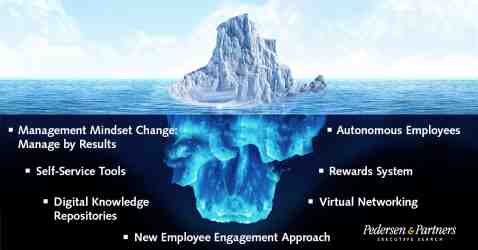Market Insights: Human Resources Management during the COVID-19 crisis
Almost three months after Portugal went into lockdown due to the COVID-19 pandemic, Pedersen & Partners carried out a survey of Human Resources Directors about how their companies have managed during the crisis: the challenges, the critical areas, and the skills needed to maintain day-to-day business in an unprecedented situation.
The HR professionals we talked to agreed that the most demanding challenges in the COVID-19 crisis are: communication and providing information to workers (30%), managing personal and family situations (23%), and learning and fostering new teleworking skills (20%).
In view of these difficulties, it is understandable that 43% of the surveyed directors chose Human Resources as the department that has made the most difference or been the most instrumental in keeping organisations operating despite a large proportion of employees working remotely. Operations was the star department for 24% of companies surveyed, and communication was key for 14%.
On the other hand, within a context in which institutional weaknesses are ruthlessly exposed, the surveyed managers ranked digital teleworking skills together with empathy and social awareness as the most necessary skills for management, ahead of technical competence. This answer makes us speculate about whether these capabilities are in fact equally important in other contexts.
With some employees working remotely while others come into the workplace under strict new safety regulations, the leaders of Portuguese companies have been put to the test every day. Our respondents agreed that the most important skills for managers during this crisis are good communication with their teams (43%) and strong resilience (33%). Creativity and innovation (14%) and empowerment (10%) complete the leadership skill set.
The World Economic Forum includes some of these proficiencies in the list of key skills to lead the Fourth Industrial Revolution in 2020, together with critical thinking, service orientation, and cognitive flexibility[1]; all deeply important capabilities in the context of new technologies and new consumer behaviour.
Many of our clients already demand these capabilities in potential candidates for leadership positions, but the truth is that these criteria are not always the ones used to define the profile, with technical skills and experience often prevailing. This new reality has shown some companies that it is no longer possible to postpone certain change decisions, and that they should not hesitate to demand and incorporate certain competencies in their management teams. For this reason, some of our clients have chosen to evaluate their leadership teams, and determine what skills they will need to develop in their leaders in the medium term.
Where do we go from here? Areas to be strengthened
Communication, IT and Human Resources appear as the top three areas in need of qualitative reinforcement (new skills) and/or quantitative reinforcement (more resources).
These areas are closely aligned with the areas that our clients worldwide have decided to strengthen. During this period, we have seen executives in these areas and additionally Sales & Marketing, Operations, and Finance, being recruited in the countries where Pedersen & Partners operates.
The sectors that have been recruiting most during the pandemic are firstly, food and packaging; secondly, health and life sciences (mainly hospitals, and pharmaceutical and biotechnology companies); and thirdly, consumer goods and retail.
With regard to the profiles searched, some of our clients are searching for communication executives in a context where providing information to workers is essential to guarantee both the company’s operations and the employees’ well-being. Here, technology also plays an important role, as companies offer multiple information channels to keep employees continuously informed. At the same time, external communication becomes even more strategic, in order to align the company more closely with customers and the community. The purpose of such corporate communication is to generate trust; with employees in one case, and with customers in the other.
Digital profiles continue to be in high demand as well. If companies suspected a few months ago that they needed to bet on digital, this need has now become pressing and self-evident. There are many companies that will have to rethink the way they reach their customers in the new normal. Many companies lack digital capabilities in their business areas, and their only profiles with digital experience are in IT. Analytics and Data Science skills are also sought after, as more and more companies use advanced analysis to combine new data sources with their own insights, allowing them to make better decisions more quickly while strengthening their ties with customers.
It is important to note that these profiles are increasingly in demand in a market with little supply, which makes employer branding strategic during the recruitment process. Companies must compete for these professionals, by looking for ways to be attractive to prospective candidates. At the same time, the fact that teleworking is here to stay will make certain profiles feasible across borders. While this increasingly globalised market for certain positions contributes to expanding the global talent pool, it reduces national talent pools, and Pedersen & Partners have already needed to import talent in this area. In those cases we have found that professionals give more weight to the corporate culture that they perceive through the recruitment process, and less weight to the company’s size and prestige in its national market.
During this period, our clients have also been looking for Human Resources managers. As we observed in the study, Human Resources is a department that has made a great difference in this crisis. The challenges are many and complex: managing people remotely and attending to different personal situations, ensuring the safety of the entire workforce, keeping people close in the context of social distancing, motivating remote teams and maintaining esprit de corps, ensuring productivity, defining new rules and new ways of working with digital tools, and in most cases, HR managers have had to do all of this while working from home themselves. It is understandable that in the face of these challenges, several companies have felt the need to reinforce their HR function by hiring new professionals.
Teleworking: the tip of the iceberg
When we asked our survey subjects if they intend to maintain teleworking in all the roles where it is possible once the coronavirus situation is over, we did not expect such an unequivocal answer. More than 90% of the companies that we consulted stated that they do intend to continue this practice in the future. These responses are in line with a recent study by Gartner[2], which indicates that 74% of 317 CFOs and Finance leaders surveyed plan to permanently move to more remote work.
Of course, this will vary greatly depending on the sector of activity. In sectors such as IT, remote working is more viable in principle, and in fact, some companies in this sector have 100% of their staff working remotely (e.g. Automattic, the owner of Wordpress.[3]) However, if we have learned anything during these months, we have learned that this practice can be adopted in many other sectors.
In any case, it seems that the momentum of COVID-19 has pushed most companies to see how far they can go with teleworking; even companies with cultures that have been less inclined to this practice are now talking about intermediate solutions and hybrid models. The first step has already been taken, and we have only seen the tip of the iceberg. The shift to teleworking and remote work implies a series of changes throughout the organisation: changes in mentality, tools, and work habits that we will have to gradually integrate into our companies.
In this process, Human Resources professionals will once again take centre stage.
Thank you all for your cooperation!



